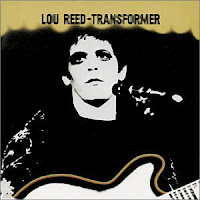 he Velvets to a very strange and varied career with sounds ranging from noise experiments to awkward punk rock. His 1972 album Transformer is a glam rock masterpiece. Much in the vein of some songs off of VU's Loaded, Transformer is much more pop oriented than some other Lou Reed efforts. Songs like "Satellite of Love" and "Walk on the Wild Side" are perfect pieces of pop rock mastery. It helped that David Bowie and Mick Ronson helmed the production of the record. The B-Side to "Walk on the Wild Side" is one of Reed's finest compositions, "Perfect Day." What sounds like a cliche and mundane lyrical balladry of a day spent with one's love comes off more like a strung out addict knowing that the life outside is sometimes hard to deal with without the help of drugs. Lord knows Lou Reed had his fair share of hard times battling with heroin, but "Perfect Day" is guised in lush orhcestration and beautiful imagery, then shadoweded with lines like "I thought I was someone else, someone good." Reality sets in sometimes.
he Velvets to a very strange and varied career with sounds ranging from noise experiments to awkward punk rock. His 1972 album Transformer is a glam rock masterpiece. Much in the vein of some songs off of VU's Loaded, Transformer is much more pop oriented than some other Lou Reed efforts. Songs like "Satellite of Love" and "Walk on the Wild Side" are perfect pieces of pop rock mastery. It helped that David Bowie and Mick Ronson helmed the production of the record. The B-Side to "Walk on the Wild Side" is one of Reed's finest compositions, "Perfect Day." What sounds like a cliche and mundane lyrical balladry of a day spent with one's love comes off more like a strung out addict knowing that the life outside is sometimes hard to deal with without the help of drugs. Lord knows Lou Reed had his fair share of hard times battling with heroin, but "Perfect Day" is guised in lush orhcestration and beautiful imagery, then shadoweded with lines like "I thought I was someone else, someone good." Reality sets in sometimes.Lou Reed's career is interesting to say the least. "Perfect Day" is a beautiful song and is a
 fantastic metaphor for the false security of drug use. Lou's guitar playing is usually a standout of most of the tracks on this album, but not here. Here we get pure, unadulturated Lou on vocals with sweeping piano and an orchestra to back up his frail and weak vocal performance that only soars during the choruses. It's a fantastic piece of music and a brilliant work of pop artistry from one of the fringe's best performers. Transformer is an album that exudes sheer pop mastery but is still enshrouded in mystery and intrigue. "Perfect Day" is a great example of this mixture of art and entertainment.
fantastic metaphor for the false security of drug use. Lou's guitar playing is usually a standout of most of the tracks on this album, but not here. Here we get pure, unadulturated Lou on vocals with sweeping piano and an orchestra to back up his frail and weak vocal performance that only soars during the choruses. It's a fantastic piece of music and a brilliant work of pop artistry from one of the fringe's best performers. Transformer is an album that exudes sheer pop mastery but is still enshrouded in mystery and intrigue. "Perfect Day" is a great example of this mixture of art and entertainment.Up Next: Big Star influences the likes of Teenage Fanclub and Elliot Smith with this next track





